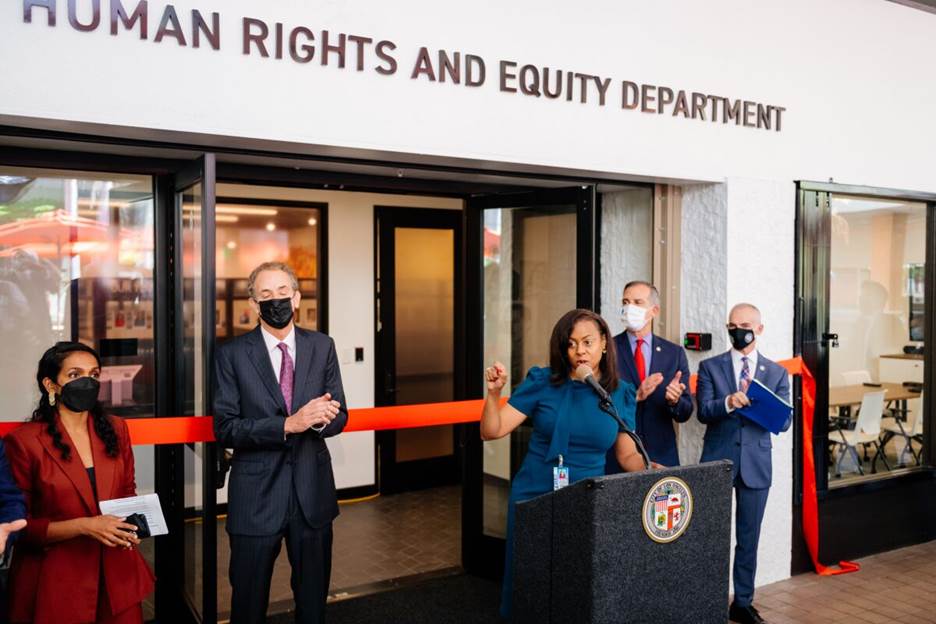
The city of LA’s Civil + Human Rights and Equity Department opened the doors to its downtown office complex in September 2021 - Mercie Ghimire / Gensler
Are You a Victim of Discrimination? The City of LA May Now Be Able to Help
By Karen Garcia
To directly support Angelenos who face discrimination, the city of Los Angeles’ Civil + Human Rights and Equity Department has launched a unit to investigate complaints about discrimination by employers, landlords and businesses.
City residents whose civil rights are violated already had the ability to file complaints with state and federal civil rights authorities, such as the US Equal Employment Opportunity Commission. But Capri Maddox, executive director of the new LA Civil Rights division, said her group will help Angelenos avoid the significant backlogs they might encounter at higher levels of government.
In particular, Maddox said, the division is a response to “our community-based organizations like the Black Worker Center, the UCLA [Labor] Center and others that stepped up to say that they wanted to see local enforcement in areas of commerce, education, employment and housing in the private sector,” Maddox said.
“We seem to miss some of the places and spaces where people are discriminated against,” she continued.
Violence, hate crimes and hate speech, she said, can be committed by managers, landlords or business owners. “So, we want to be intentional in the city of Los Angeles to really say that ‘hate has no home in this city,’” Maddox said.
If someone has faced discrimination in LA, they can file a complaint with the division and begin the process of seeking redress for their grievances. Here are some of the details.
How do you file a complaint?
Before you submit a complaint, know that filing one doesn’t prevent you from pursuing any other available criminal, civil or other remedies.
You can file a complaint by visiting the LA Civil Rights website , by emailing civilandhumanrights@lacity.org, or by calling (213) 978-1845. Joumana Silyan-Saba, the division’s director of policy and enforcement, said the division will check to see whether the alleged discrimination meets four criteria:
- It occurred within the city of Los Angeles.
- Less than three years passed before the intake form was submitted.
- The alleged discrimination occurred in the private sector (affecting commerce, education, employment or housing). The division does not have the authority to investigate complaints against public entities, including other city departments.
- The alleged discrimination targeted someone in a protected class (that includes discrimination on the basis of race, gender, disability, citizenship status or religion).
Filing a complaint is a difficult first step.
“You can have situations where people are going to come into our offices with all of their written documents in a plastic bag, and they’ll be crying, or they may speak a language other than English, or they may not really understand how the process works at all,” Maddox said.
Maddox and Silyan-Saba said the intake and investigations team try to keep empathy and compassion at the forefront of this process.
Silyan-Saba said her team recognizes that those who are reaching out to the division are also experiencing trauma, so they’re equipped to help address that aspect as well.
Will my identity be revealed?
The complaint intake (where you provide basic contact information) and review processes are confidential. But once the investigator moves into the enforcement phase, Silyan-Saba said, the process becomes public.
For example, when the division files a notice of violation, it’s a public document that names the complainant and the person accused of discrimination (the respondent). If the respondent wants to have an administrative hearing, that’s a public process as well.
If you’re worried about retaliation for filing a complaint, Maddox said, retaliation against any person for exercising rights that are protected by the city of Los Angeles’ civil and human rights ordinance is prohibited and punishable as a misdemeanor.
What happens after I file a complaint?
Once it’s determined that the criteria are met, the investigation phase begins. The investigator will work with the complainant to obtain any additional documents or information needed. The investigator will also go over the process with the complainant.
The investigator will go through the same process with the respondent and ask the individual for any relevant records. This portion of the investigation could require site visits.
The division has subpoena power, so investigators can compel people to provide documents and other evidence.
If it finds that discrimination has occurred, the division will consult with the complainant and issue a notice of violation. The respondent will then have 15 days to ask for an administrative review.
If the respondent requests a hearing, a hearing officer will review the case and uphold all, some or none of the notice of violation and penalties. The process will end there unless the respondent or complainant can show some abuse of discretion by the hearing officer. If so, the case will go to the city’s Commission on Civil Rights, which will review the case once more. The commission has the final say, per the city ordinance.
The agency can encourage the complainant and the respondent to negotiate a settlement, although it’s not required. It can also refer the two sides to a mediator…
San Francisco and San Diego already have agencies that investigate discrimination complaints on a local level. Now that LA has one, Cuevas said, it could become a model for statewide partnerships “to create a seamless enforcement strategy that protects the [city’s] diversity and ensures a diversity in our housing and in our workplaces.” – Los Angeles Times

